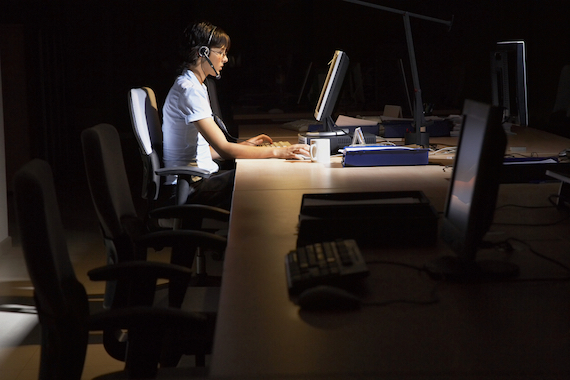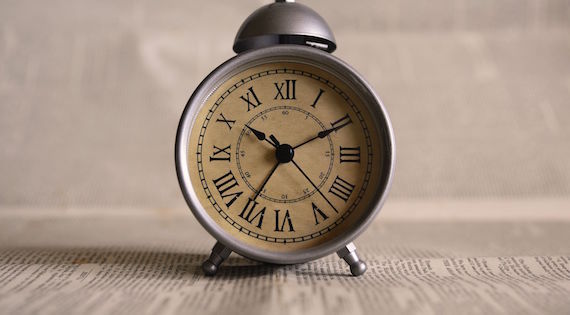
When you try to become more productive, you don't get there by mere willpower. In order to attain peak productivity, you've got to have a plan. In this article, you'll learn an easy-to-follow plan that will improve your productivity.
The secret is simple -- discovering the best time of day to work.
Productivity isn't just about cool email tricks or nifty time management strategies. Those are important, but it's more -- it's about harnessing energy and time to do more and better work.
If you follow this plan, you will become more productive. It's just that simple. Here is the five-step process.
1. Determine your optimal part of the day to work.
The first step in discovering your best time is to do a careful self-analysis. In this step, your goal is not to set a strict schedule, but to find the broadest part of the day that you are going to be more productive.
Here are two questions to guide you to this discovery.
When during the day do I have the greatest amount of energy and concentration?
When do you feel the most alive, energized, creative, optimistic, and enthusiastic? For me, this is the morning. For my wife, it's the evening. Our work schedules blend, allowing us to share childcare and household duties while still maintaining high levels of productivity.
Discover when you're at your peak -- morning, afternoon, evening, etc.
When do I have the fewest interruptions and distractions?
Part of productivity is being able to shut out the distractions that cripple concentration. Now that you know when you have the highest amount of energetic output, determine when the major distractions are. These are the times when you should avoid scheduling a productive period.

2. Identify one, two, or three 90-minute periods for concentrated work.
Now that you've determined the phases of your highest energy, it's time to carve out one to three 90-minute periods. These 90-minute sessions are your productive bursts.
Why 90 minutes? Work cycle research has shown that most people work best in 90-minute cycles followed by a reprieve.
This principle is built upon our body's ultradian rhythms, and it's futile to fight against them even with artificial stimulants such as caffeine and sugary intake. As Drake Bauer wrote for the Fast Company, "The 90-minute cycle works."
Obviously, you don't need to set a timer (unless that helps). Instead, use the 90-minute period as an approximation to measure your energetic output.
What happens in between each cycle? That's up to you and your unique situation. What you should not do, however, is work -- or at least work like you've been working for the past 90 minutes. You should take a break -- a good, solid, get-up-and-move-around break.
Most mornings, I have two 90-minute cycles, followed by a three and half to four hour break. After that, I finish out my workday in the late afternoon with a final 90-minute cycle.

3. Do the right work at the right time.
Not all work is equal. Different types of work require different levels of energetic output. Some work may be completely draining mentally. Other types of work might be energizing and exciting.
You should do the most demanding tasks during your time of greatest energy, and distribute your less demanding tasks across your times of waning mental strength.
It may seem counterintuitive to do your hardest and most challenging tasks first. Won't that leave you wasted for the rest of the day?
Not exactly. As Brian Tracy explains in Eat that Frog, getting monumental tasks completed in the early part of the day is not enervating, but energizing.
The sense of completion and success signals psychological reward centers in our brain that fuel further productive work. Rather than drain us, completing big tasks has the power to motivate us.

4. Tolerate strategic interruptions.
You have a life, and you need to factor that into your productive zone discovery. There are kids to care for, meetings to attend, meals to eat, and maybe naps to take. How do interruptions factor into your best time of day to work?
As explained above, we work best in 90-minute cycles. You shouldn't try to power through the day in an uninterrupted productive blast. Instead, use your built-in cycles of energy to embrace your interruptions at the right time.
My greatest and most enjoyable interruption happens around lunch. I come home to my family, enjoy a meal, play with the kids, and do some household chores. This may be an unorthodoxy for those who swear by the nine-to-five rule, but since such unorthodoxy gives me insane levels of productivity, it's okay.
When I return from my three-hour hiatus, I'm energized, creative, and prepared for another 90-minute zone to finish out my day
When you look at your day, find those times where the distractions are the lowest and your energy is the highest. Then look at your interruptions. Enjoy them. Use those interruptions to enhance your productivity, not hamper it.

5. Be creative with your schedule.
There is one universal limitation we all work with -- the twenty-four hour day. Within these allotted hours, we must find our most productive work times. If you discover that the traditional nine-to-five is your productive zone, so be it. However, there are many hours beyond this conventional timeframe that might just be your most productive. Confront your limitations, then discover your best time.
To do that, you might just have to think outside the box.
We all face other limitations that require creative solutions. When Nelson Mandela was imprisoned in a South African prison, he wrote his memoirs during the night and slept during the day. He was enormously productive in this secret project, completing a massive amount of writing during a very short amount of time.
Some uber-productive people sleep late, goof off half the day, and step into their productive zone around 8 p.m.. Then, from 9 p.m. to 2 a.m. they hit their stride and churn out enormous amounts of work.
What works best for you? Be creative.

Conclusion
Finally, be free to have fun. It's way too easy to become a slave to productivity, and forget about the freedom and fun that it allows! Productivity is a strategy that allows you to enjoy life, not become dominated by schedules and tasks.
The only way that you'll enjoy the productive life is if you're being truly productive and having fun. Do both with a passion.
